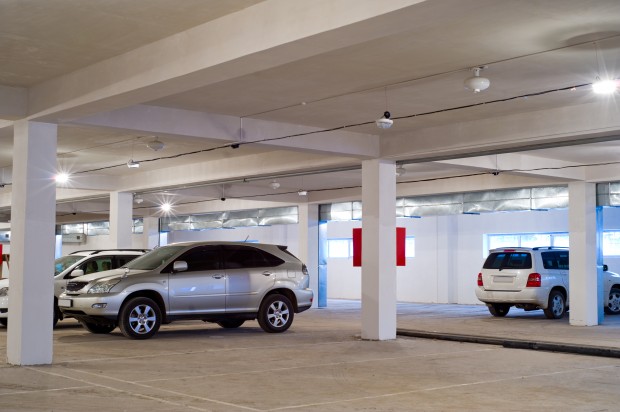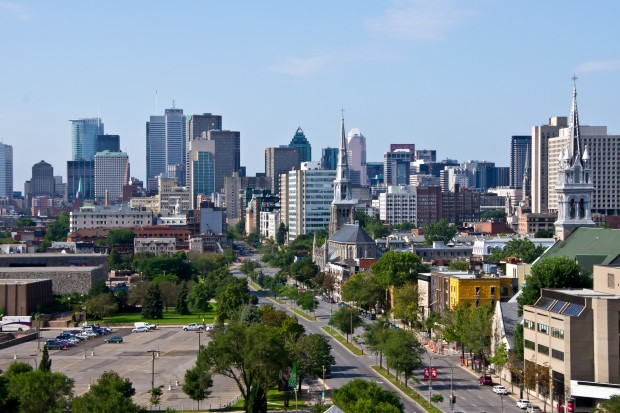How to buy a new condo and save money

For somebody looking for a new home, these are confusing times we live in. Gone are the good old days of les habitants, when all you had to do was walk into a clearing, drive a stake into the ground, and call it a homestead. Gone are the days of the bourgeoisie when a vast estate would be handed down to you from your parents; now all they hand down is their collection of bibelots and their predisposition towards bad teeth. And because you will never get a free condo in your marshmallow cereal box, you probably need some tips on how to become a homeowner without shelling out 5,000 x more than you’re paying now. Trust me, if you know the ropes, there are definitely ways to save on your big buy.
1. Plan your finances
Before you do anything, set up a budget. Buy a little notebook. Make some notes, draw a few pictures. Bring it to the bank. When getting a loan, apply for the maximum that you are willing to pay. This way you'll have to negotiate for that or less. It’s always helpful to impose this sort of discipline on yourself, so that when you start visiting condos you don't all of a sudden realize you need that living room jacuzzi. Besides the mortgage, don't forget to factor in closing costs, moving, land transfer tax and lawyers' fees.
2. Buy it before it exists
That's right, invest in a big swatch of empty air, a space in the sky. Have you ever heard anything more whimsical? When a condo development gets the green light, the developer draws up plans, projections, and a whole bunch of computer-generated photos that make the building look like it glows and everything else in the city doesn't. These condos, in “Pre-construction”, are often sold directly by the developer in what is called a “presale”. Now why could this save you money?
First, buying a condo in presale will allow you to pay your deposit in instalments. No condo fees, mortgage, pet spa membership fees, nothing. This gives you more time to save up while still having the assurance that you and your home will be ready for each other at about the same time.
Secondly, there's the chance of increasing value. If you buy one of these choice condos from a trusted developer, they will most likely increase in value and appeal as the word gets out about this prestigious development. So, not only will you have paid less than the people who follow the hype and want in later in the game, but should you want to sell, the rule of scarcity will ensure that you'll see a handsome return on your investment.
This being said, avoid buying during the week following the launch of the project, since you want to first assess its popularity. Purchasing once the project is 40% sold is a good idea, because the developers usually need to sell 50% of the project before they can begin construction. Naturally at this stage they are usually eager to sell their units.
Conversely, if you are willing to wait until the end and buy one of the last suites, you can make significant savings, sometimes exceeding 10%. This is because these units are simply being sold off so that the developer can amass enough capital to start a new project.
3. Get some help from the city
Here's a super top-not-so-secret tip: you can save money under Montreal's Home Ownership Program. There are two ways you could benefit from this program. First, by receiving financial assistance. or by obtaining a refund of your “welcome” tax.
This new home of yours should not exceed $250,000 dollars. If it does, you're not poor enough to get any money, and you can keep taking your weekend vacations to the Bahamas with the Romneys without the city's help, thanks. If you are purchasing a new property with a value under $250,000 and you do not have children, you are eligible for a $4,500 discount.
If you have one or more children (count them) then you are eligible to receive a lump sum of $10,000 if the property value is $280,000 or less. You can also have 100% of your real estate transfer tax refunded. You'll receive $12,500 back for a $360,000 or less “family housing unit” that has a minimum of three bedrooms. Very specific, City of Montreal (COM among friends).
Lessons to take from this? Use that time you're spending saving up for a home to also, uh, alleviate all the stress by burning calories and adding to the brood! Or adopting, or however you do it. Kids=bigger discount.
Another lesson is to negotiate your price with these city perks in mind. For example, if you have a child, and you would like to receive the $10,000, try to negotiate the home down to $280,000.
You can get an even greater discount if your new home meets Novoclimat energy efficiency standards or is LEED-certified, so all these babies you made won't die of lung cancer from a polluted earth in 50 years. It's all interconnected.
It is also worth noting that the official COM website states that “households with children who take advantage of this program are eligible to receive 6 months of free public transit...” AHA! Quebec, I'm on to you! Gone are the days when yearly babies were expected from on high. Free OPUS cards are the new incentive to reproduce!
4. Ditch the fancy amenities package
You don't need all those fancy extras in your building. For example? A rooftop pool. It'll be brown iced-leaf soup for half the year. A gym? It won't hurt your fairy feet to walk down the street on the same lowly pavement as all the commoners to get to the Y. A theatre room? Get a TV and invite some friends over, or, get this, go to the movies. A pet spa. PET SPA?! Gurl puh-lease. Are you seeing the pattern here? It seems like not having all these amenities in your building will just encourage you to step out of doors, to explore your neighbourhood, to make friends. And that is what Montreal is all about, anyway. No one stays at home all the time, because, well, boooooring.
5. Parking
Parking in the city. Sounds romantic, doesn't it? Well, replace these daydreams of teenage makeout sessions with the jarring reality of being hit with a $40,000 payment to make on your measly little underground parking space. Basically what was the erstwhile selling price of your grandparents' entire cattle ranch... now being spent on a slab of pavement. But the good news is, you don't have to pay it. Ditch the car. You don't need it. Living in Montreal is great for public transit, for biking, and for walking. Everything you need is usually within walking distance, and when you need to go a bit further the bus is ready to whisk you away (you can use that free Opus card that you got because you reproduced). Do you live in the Old Port? Take a horse and buggy! Only need a car once in a while? Become a part of a carshare program, where you can book a car online or by phone, pick it up and use it for your day trips out of the city. More information at: www.communauto.com.
For those of you who refuse to get rid of their cars because they are determined to be a nuisance to breathers of air everywhere, you can just look for a condo that has parking included in the purchase price. But you didn't hear it from me.
6. The Neighbourhood
Where do you want to live? Corner of Saint Laurent and Saint Denis? Hah. You're going to have to tone down your unrealistic dreams a bit and douse them in a cold cup of Saint Henri diner coffee, because Saint Henri is probably where you're going to end up.
When looking for the right neighbourhood, the mantra is balance, balance, balance. Remember we established that you would not have fancy amenities in your building? You're definitely going to want to live in a neighbourhood where everything is accessible. On the other hand, you don't want to live in the trendiest neighbourhoods because although they are the most amenity-rich, they will also be the most expensive. And just like you can live without a pool in your building, I'm sure you can live without a vegan cafe at every corner.
Instead, invest in a neighbourhood that is adjacent to a trendier one. If you invest in one of the popular neighbourhoods, they are more likely to stagnate as their glory days dwindle and their value “plateaus”. Other places will inevitably become more of-the-minute and appealing to new buyers. For example, the Plateau is sure to be expensive, whereas Rosemont—la-Petite-Patrie will be less expensive and is increasingly not-so-boring, with developers anticipating its impending popularity and peppering it with new condo projects. If you target an area with many new developments, you can compare pricing and bargain with developers by pitting projects against each other. Make them want you!
Griffintown is enjoying an unprecedented boom, and prices are skyrocketing. But it is completely possible that in a few years Griffintown will be so condo-saturated that developers will be competing for you. If you can't wait until then, neighbouring Saint-Henri, enjoying modest growth for now, is much less expensive. Logically, Saint-Henri will be next to catch the real-estate measles. It is all about having the foresight to see these things. So move to Saint-Henri, and, in the meantime, if you want to feel hip, you can suck it up and walk the four blocks to Griffintown.
7. Promotions
Another thing to watch out for are builder promotions, sales, and all manner of exclamations on their websites, usually in tacky font and caps lock---NOW ONLY 3 SUITES LEFT, GET A $4,000 REBATE! CLOSING SALE, ACT FAST! GET ALL YOUR APPLIANCES, FREE!
Sometimes the promotions involve furnishings. This is why it's good to check and see if your appliances are included, if your air conditioning is included, if toilets are included or if there is a common outhouse, you know. These things can make a huge difference. Sometimes your appliances are only included if you purchase the condo in its presale phase, etc. Make sure you know what you're getting. You can save a lot of you make sure everything is included in the purchase price.
8. Create your own discount
Doesn't seem like they're offering any perks? Be coy. Be unfaithful. Go see other developers. Make offers to several entrepreneurs, and show other promoters the preliminary contracts and deals you've managed to get. They'll have to beat the price if they want to keep you. Soon they'll all be vying for your affections. You might be able to save up to 5% of the price. But don't stop there. Quartz countertops, you declare. Air conditioning! A TRAIL OF ROSE PETALS! Tell them what you want and see how much your affections really mean to them. Negociate your condo!
9. Tick Tock
Timing is key when it comes to the ups and downs of the real-estate market. You want to buy when other people aren't looking, because as soon as people start looking, prices go up, up, up.
So when are people too distracted to look? When can you strike? December and January are perfect months to snap up a home, because most people are focused on Christmas or New Year's or their resolutions or the huge credit card bill that all of these combined has incurred. So step out from under your vitamin D lamp for a second and take a look around, and add one more thing to that credit card bill. Can't hurt!
June and July are also good months to buy, because people are enjoying themselves. They're in the Rockies. They're canoeing. Camping. Eating ice cream. You, on the other hand, are protecting your diaphanous complexion by staying indoors and looking for a condo.
Avoid buying in February, March, and April, when 60% of condos usually get picked up. In Quebec, leases generally expire on July 1st, so sometime during these months people snap out of their California Dreamin' long enough to realize that July is actually not so far away, and they better get in gear. Seeing as demand skyrockets during this time, your chances of being able to negotiate a lower price are slim. Sales representatives provide less thorough help—and are far grumpier—because of the sheer amount of work they have to do. So surprise them with flowers in the dead of January, or waltz in to their offices in August, when you're sure to be greeted with a smile and a discount.
Saving money can be tough, but remember, when you used to save all your empty bottles and bring them to the dep for a refund? Man, the little things really add up!





Stock images: Shutterstock
Related articles
Most popular articles